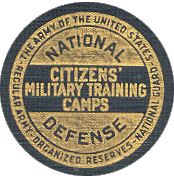
Citizens' Military Training Camp


The 22nd Infantry at Camp Mc Clellan 1924
Part 2 - The 22nd Infantry
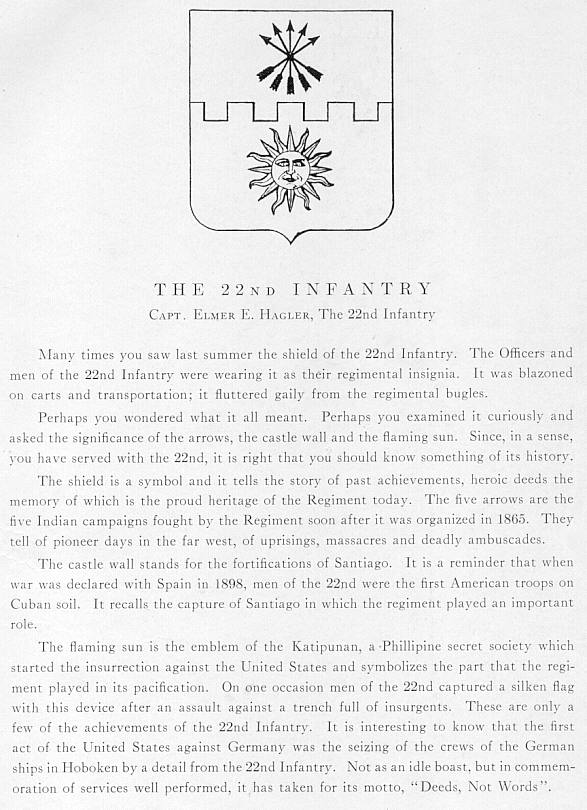
The above was written by
Captain Elmer Hagler of the 22nd Infantry
in 1924, describing the distinctive insignia of the Regiment.
It was only the previous year, 1923, when the US Army officially
authorized
the Coat-of-arms and Distinctive Insignia for the 22nd Infantry.
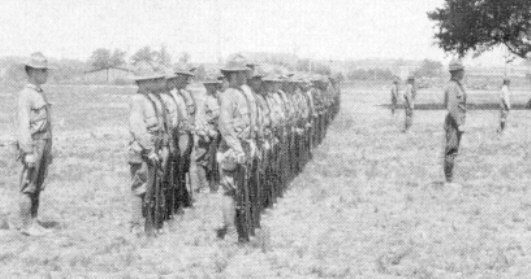
Led by an officer of the 22nd Infantry, a CMTC company stands in formation.
Regular Army Regiments were the official sponsors of the Citizens' Military Training Camps. At Camp McClellan General Winans, Commander of the 8th Brigade of IV Corps, had overall command of the Camp, while under him, the Regimental Commander of the 22nd Infantry had command of the CMTC at Camp McClellan. The 22nd Infantry, under the command of Colonel D. W. Ryther, acted as the parent training unit for the CMTC. Under the War Department's new "One Army" policy, for the first time in actual experience, Regulars, Reserves and National Guardsmen worked together as one big team.
The CMTC companies were commanded by officers of the 22nd Infantry, who were assisted by Reserve officers from corps area organizations. This was an ideal solution to giving Reserve officers practical experience with troops every year. The 22nd Infantry was responsible for organizing and maintaining the necessary structures for administration, supply and training of the CMTC companies.
The CMTC students were organized into a regiment of Infantry, consisting of fifteen companies, and a squadron of Cavalry, consisting of three troops. Students from the White and Blue courses were assigned to the Basic and Red course companies as officers and non-commissioned officers. The men of the 22nd Infantry companies provided demonstrations and instructors for the student companies.
The following message to the
trainee students was printed in the yearbook
for the 1924 CMTC program at Camp McClellan:
MESSAGE FROM THE 22ND INFANTRY
The
officers and enlisted men of the 22nd Infantry, who sponsored the
various companies of the CMTC,
wish to assure you that the Regular Army was proud to assist in
the training of the citizen forces.
That pride has been expressed in much hard labor on our part, in
building your camp and preparing
your equipment for issue, so that you might be spared many of the
disagreeable features that confront a recruit
in the regular service.
We
further expressed our pride in you by putting out three
"good squares" daily which, we hope,
have helped you to put on weight, so that you might go home a
finer physical specimen than when you arrived.
We have furnished you some of our best noncommissioned officers
to train you and endeavored to give you
some idea of how a first-class Infantry company is run.
You have
responded to our effort to such an extent that we are able to
point with pride
to the result of our endeavors and brag about you all next
winter.
You
realize, we are sure, that these results could not have been
attained without your earnest co-operation.
We have labored all through camp to help you and you have met us
half way. Many of the things
considered essential to military training, such as early rising
and stated times at which to do stated duties,
were difficult to learn at first. At school, if you were
fortunate enough to make the training table,
you did not hesitate to submit to the discipline of your coach.
While at camp we were your coaches,
all engaged in doing our best to help you get the full benefit
from your month here.
You were
only one of nearly two hundred in your company. In a military
organization the individual counts
for very little but the organization or the team is the thing
that counts. Because you could not see all
the sides of a question, you have at one time or another received
orders that did not seem exactly right to you,
but remember that the man who issued the orders was thinking of
the whole company, not just about you,
and even though for the moment the order seemed to be difficult,
it was up to you to forget yourself individually
and to boost your own entire outfit loyally.
Uncle
Sam issued you a lot of clothing and equipment for which you were
responsible. This was
government property, and was bought by the government with the
money that your fathers paid out in taxes.
If you lost or mistreated it, the government looked to you for
reimbursement; for if you did not take care of it
and caused loss to your government it would not have been fair
that all other citizens in the country
should have to pay additional taxes to buy clothing lost or
destroyed through your negligence.
This was a part of your training to teach you to take care of
your clothing and equipment.
Our hope
is that the lessons you have learned here will be carried to your
homes and put in your
daily practice in everything you undertake. If you do this you
will reap the reward of increasingly better results
from your efforts. We would teach you to become leaders among
men.
You should each be a walking advertisement for Uncle Sam—a leader in your home community.
The
regimental motto of the 22nd Infantry is "Deeds, Not
Words" and we have tried
to supply our quota of the deeds to make your stay pleasant and
profitable.
|
THE CMTC COMMANDER AND HIS STAFF Standing, left to right: Seated, left to right: All are 22nd Infantry Officers They all wear the 22nd Infantry Distinctive Insignia on their hats. |
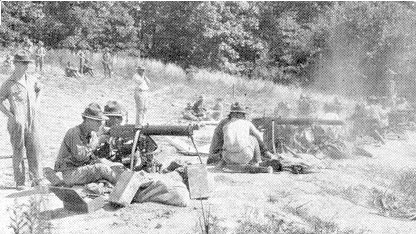
Students fire the .30 cal Browning water-cooled machine gun while 22nd Infantry instructors look on.
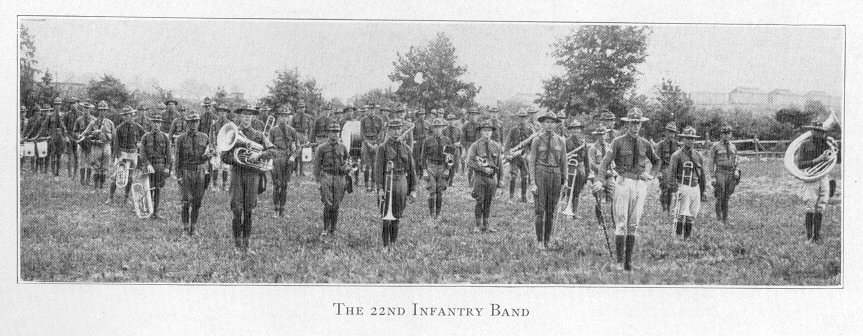
The 22nd Infantry Regimental Band, Camp McClellan 1924
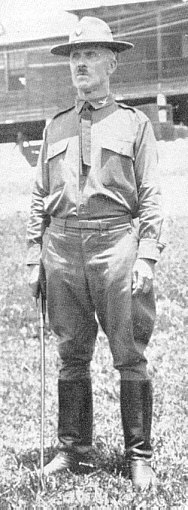
D. W. Ryther
Colonel, 22nd Infantry
Commanding CMTC
Camp McClellan 1924
|
Above: The 1924
Cimitracam yearbook for the CMTC program Left: Plate in the yearbook thanking the 22nd Infantry |
The following passages from the 1924 Cimitracam illustrate the student trainees' view of the 22nd Infantry:
HISTORY OF COMPANY "H"
The best machine gun
company in camp. We drilled so well that the observers asked if
we were "H" Company of the 22nd Infantry.
On the range "H" Company did some excellent work. In
addition to being the highest in percentage of men qualified,
the company can boast a squad (Corp. Jeffer's) that qualified
more experts than any one M. G. company in camp.
Our company was commanded by Lieut. Inman of the 22nd Inf., whom
we hope to have with us again next year.
HISTORY OF COMPANY "I"
This company, organized
on July 3d, was known as the "fighting I". Captain G.
C. Graham of the 22d Infantry,
Company Commander, was assisted by Captain J. W. Gibson, DOL, and
Lieutenants Rushing and Lowry.
Sergeant Naramor of the 22d Infantry, was our 1st Sergeant, a
sociable man, but when it came to business, the "top
kick".
The processing was completed the day of our arrival in camp. The
first drill took place the following Monday. The Basics despaired
over the Manual of Arms and "squads right", but thanks
to the efficiency of the Regular N. C. O.'s, Blues and Whites,
they were doing excellent work at the end of the first week. At
the end of this period we organized a crack platoon.
We challenged all of the companies in camp, including the famous
composite platoon of the 22d Infantry, but our challenge was not
accepted.
HISTORY OF COMPANY "P"
Our camp life began when
our train pulled into the station at Anniston. We were met by the
men of the "Good Old 22nd"
who directed us to the trucks that transported us to Camp
McClellan
Also in the 1924 yearbook was the following page:
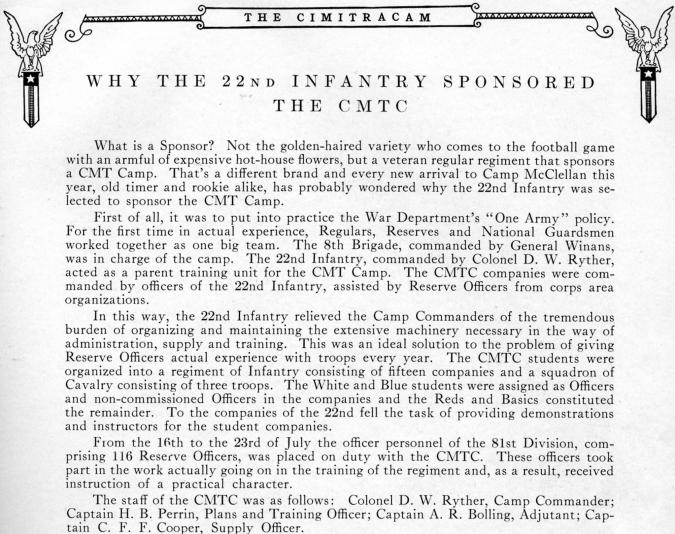
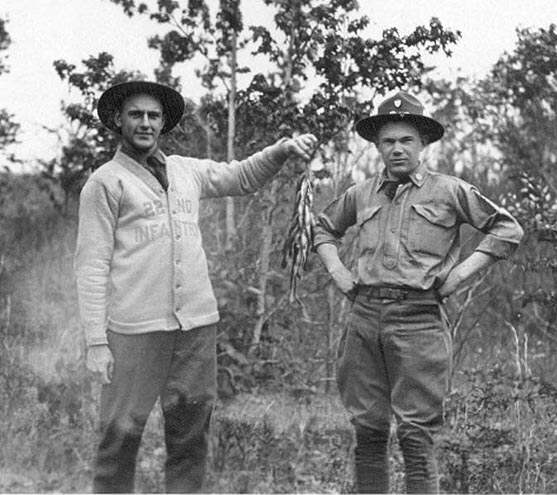
A catch of small fish,
May 4, 1925 Camp McClellan
Pvt Terrell on the left, SSG Moore on the right
Note Pvt Terrell's sweater with "22nd Infantry" across
it,
and the 22nd Infantry DI on SSG Moore's hat.
webmaster's collection
Home | Photos | Battles & History | Current |
Rosters & Reports | Medal of Honor | Killed
in Action |
Personnel Locator | Commanders | Station
List | Campaigns |
Honors | Insignia & Memorabilia | 4-42
Artillery | Taps |
What's New | Editorial | Links |